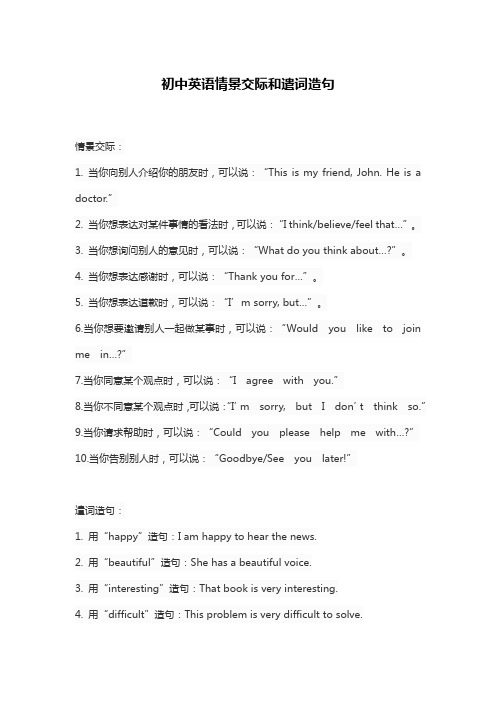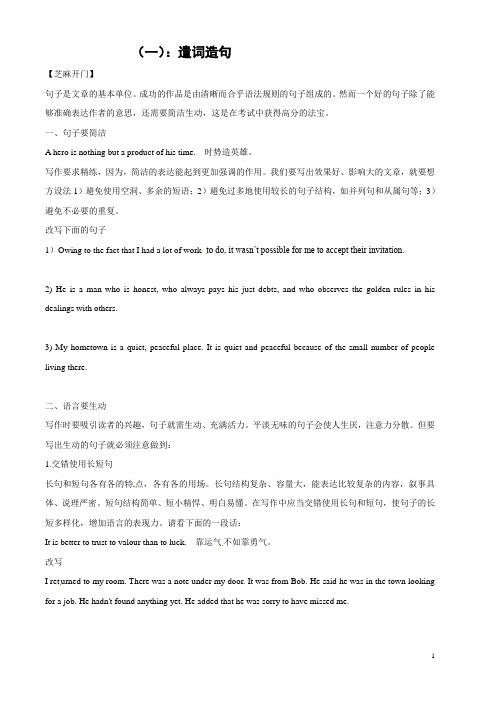简单句的遣词造句
初中英语情景交际和遣词造句

初中英语情景交际和遣词造句情景交际:1. 当你向别人介绍你的朋友时,可以说:“This is my friend, John. He is a doctor.”2. 当你想表达对某件事情的看法时,可以说:“I think/believe/feel that…”。
3. 当你想询问别人的意见时,可以说:“What do you think about…?”。
4. 当你想表达感谢时,可以说:“Thank you for…”。
5. 当你想表达道歉时,可以说:“I’m sorry, but…”。
6.当你想要邀请别人一起做某事时,可以说:“Would you like to join me in…?”7.当你同意某个观点时,可以说:“I agree with you.”8.当你不同意某个观点时,可以说:“I’m sorry, but I don’t think so.”9.当你请求帮助时,可以说:“Could you please help me with…?”10.当你告别别人时,可以说:“Goodbye/See you later!”遣词造句:1. 用“happy”造句:I am happy to hear the news.2. 用“beautiful”造句:She has a beautiful voice.3. 用“interesting”造句:That book is very interesting.4. 用“difficult”造句:This problem is very difficult to solve.5. 用“friendly”造句:He is very friendly and easy to talk to.6. 用“excited”造句:I am excited to go on vacation.7. 用“nice”造句:You have a nice personality.8. 用“worried”造句:I am worried about my exam.9. 用“tired”造句:I feel tired after working all day.10. 用“lazy”造句:He is a lazy student.在日常生活和学习中,掌握这些情景交际和遣词造句的方法,对我们的英语表达能力会有很大帮助。
中考专项复习之遣词造句

陈述句是用于陈述事实和观点的句子。包
括肯定结构和否定结构。肯定句变否定句的 基本方法如下: 1.be 动词、情态动词的否定式:在be动词、 情态动词后面加否定词not。 如:We aren't classmates. 我们不是同学。 I can't speak English well. 我英语说得不好。 2.实义动词的否定式:借助助动词do/ does构成。一般现在时的句子结构为:主语 +doesn't/don't +动词原形+其他。如:He doesn't do exercise every day.他不是每天锻炼。
2.there
be句型 当there be后有两个或几个 并列的主语时,be动词的数和与其靠得最近 的那个主语一致。 如: There is a table and six chairs in the dining hall. 餐厅里有一张桌子和六把椅子。 There are six chairs and a table in the dining hall. 餐厅里有六把椅子和一张桌子。
5.“a
number of+名词复数”作主语,谓 语动词用复数;“the number of+名词复数” 作主语,谓语动词用单数。如: A number of workers have recently left the company. 最近有很多工人辞掉了工作。 6.“the+形容词”表示一类人,作主语谓 语动词用复数。如:The old are more likely to catch cold than the young. 老年人比年轻人更容易感冒。
that, so that, so„that, such„that(以至于 „„)
语病 遣词造句

语病遣词造句
语病是指语言表达中存在的错误或不当之处,这通常涉及到语法、语义、语境和表达方式等方面的问题。
遣词造句是指选择适当的词语和句子来表达意思,是写作和口语表达的基础。
例如,以下是一些常见的语病和遣词造句问题:
语病:
1. 主谓不一致:如“她很漂亮,我很丑。
”应该改为“她很漂亮,而我很丑。
”
2. 前后矛盾:如“他昨天去了北京,今天回来了。
”时间上存在矛盾。
3. 冗余重复:如“他们一起去了电影院看电影。
”存在重复表达。
遣词造句问题:
1. 使用不当的词语:如“他很顽固,不愿意改变自己的想法。
”中的“顽固”可能不适当,可以考虑改为“固执”。
2. 句子结构不当:如“他走过来,向我借了一本书。
”这个句子缺少主语,应该改为“他走过来,向我借了一本书,然后离开了。
”
3. 语义不明确:如“她喜欢看小说和书。
”中的“书”与前面的“小说”重复,应该改为“她喜欢看小说和其他书籍。
”
要避免语病和遣词造句问题,需要注意以下几点:
1. 注意语法规则,保持句子结构清晰。
2. 仔细选择词语,确保表达准确。
3. 注意前后文关系,保持逻辑一致。
4. 多读多写,提高语言表达能力。
英语写作---遣词造句

(一):遣词造句【芝麻开门】句子是文章的基本单位。
成功的作品是由清晰而合乎语法规则的句子组成的。
然而一个好的句子除了能够准确表达作者的意思,还需要简洁生动,这是在考试中获得高分的法宝。
一、句子要简洁A hero is nothing but a product of his time. 时势造英雄。
写作要求精练,因为,简洁的表达能起到更加强调的作用。
我们要写出效果好、影响大的文章,就要想方设法1)避免使用空洞、多余的短语;2)避免过多地使用较长的句子结构,如并列句和从属句等;3)避免不必要的重复。
改写下面的句子1)Owing to the fact that I had a lot of work to do, it wasn’t possible for me to accept their invitation._____________________________________________________________________________2) He is a man who is honest, who always pays his just debts, and who observes the golden rules in his dealings with others._____________________________________________________________________________3) My hometown is a quiet, peaceful place. It is quiet and peaceful because of the small number of people living there.______________________________________________________________________________二、语言要生动写作时要吸引读者的兴趣,句子就需生动、充满活力。
英语的遣词造句

英语的遣词造句1. 英语的遣词造句就像搭积木一样,选对了单词就能搭出漂亮的城堡!比如“I'm over the moon”(我欣喜若狂),不就生动地表达了高兴的心情嘛!2. 你知道吗,英语的遣词造句能让你的表达变得超级有趣!像“He'sa real couch potato”(他真是个电视迷),多形象啊!3. 英语的遣词造句那可真是神奇啊,能把复杂的意思简单说!“It's raining cats and dogs”(下着倾盆大雨),是不是很有意思?4. 哎呀呀,英语的遣词造句多重要啊,能让你瞬间和别人不一样!“She's a busy bee”(她是个大忙人),这样说多可爱呀!5. 英语的遣词造句有时候就像魔法,轻轻一变就很精彩!“He hit the jackpot”(他中了头彩),多让人兴奋的表达呀!6. 嘿,英语的遣词造句能让你的话变得好有魅力!“You're the apple of my eye”(你是我的掌上明珠),多甜蜜呀!7. 英语的遣词造句可是很有讲究的哦,用好了就像锦上添花!“She's as cool as a cucumber”(她非常冷静沉着),太妙了吧!8. 哇塞,英语的遣词造句能带来意想不到的效果!“He's a night owl”(他是个夜猫子),简单又易懂!9. 英语的遣词造句真的能让你的语言活起来!“I have a frog in mythroat”(我喉咙沙哑),这比喻多生动!10. 不得不说,英语的遣词造句太关键啦,能让你的交流更顺畅!“That's a piece of cake”(那是小菜一碟),多轻松的表达呀!我觉得英语的遣词造句真的超级重要,能让我们更好地表达自己,也能让交流变得更加有趣和顺畅。
我们应该好好掌握和运用它!。
遣词造句100词

第一词:TRY我们先看几个来自生活中的句子,都是常见句子(注:所谓Chinglish只是相对,并非绝对):1、这蛋糕真好吃,你尝点。
Chinglish:This cake is so delicious, please eat a little.Revision: The cake is so delicious. Please try some.2、这样不行,你再看看。
Chinglish: It won't do. Please see it again.Revision: It won't do. Please try again.3、我做过一两次,都失败了。
Chinglish: I did one or two times, but I failed.Revision: I tried a couple of times, but I failed.4、请您放心,我一定有多少力,出多少力。
Chinglish: Please put down your heart. I'll give all my strength out.Revsion: Don't worry, I'll try my best.5、这件裙子真漂亮,你穿上看看?This skirt looks so beautiful. Would you please try it?————————————凡是带有“尝试”、做事没底但是还是做了等,可以选用try一词,简单又实用。
当然,try还有审判的意思。
So, Please try this word more often.第二词Enjoy这一动词我印象比较深刻,它的用法比较简单,凡是带有“享受到”的意思就可以用。
反义词是suffer (from)。
经典用法是享有。
声誉。
在公司、单位英文介绍里可以说简直是不可或缺的一个词。
如:In Africa, Botswana is one of the few countries which enjoysa good reputation for corruption control and the DCEC has attracted favourable attention from analysts, donors and Botswana's regional neighbours.顺便再说一句,好的用enjoy,不好的可用suffer。
遣词造句的典型例子

遣词造句的典型例子
以下是 9 条关于遣词造句的典型例子:
1. “他说话跟机关枪似的,‘哒哒哒’不停,可有意思了。
就像那夏天的暴雨,一阵又一阵!” 例子:你听听他,一开口就停不下来,真是说话跟机关枪似的啊!
2. “她笑起来那叫一个甜,跟蜜罐里的蜜一样甜滋滋的。
” 例子:哇,她笑起来太甜啦,跟蜜罐里的蜜一样甜滋滋的这种形容太贴切啦!
3. “这小子,猴精猴精的,像只小猴子一样调皮捣蛋。
” 例子:哎呀,别闹啦,你看你跟个小猴子一样猴精猴精的。
4. “这人的脾气,那简直就是火山,说不定啥时候就爆发啦!” 例子:别惹他,他脾气跟火山似的,你可小心点呀!
5. “她的歌声宛如黄鹂鸟一样悦耳动听,让人陶醉。
” 例子:听啊,她的歌声宛如黄鹂鸟一样悦耳动听,是不是特别棒!
6. “这家伙跑起来像一阵风,嗖的一下就没影了。
” 例子:他刚才跑太快了吧,像一阵风似的,嗖的一下就没影了,真厉害!
7. “那小孩哭得惊天动地的,跟世界末日了似的。
” 例子:哎呀,那小孩怎么哭得惊天动地的呀,跟世界末日了似的,赶紧哄哄。
8. “他写的文章犹如锦绣画卷,美不胜收。
” 例子:你看看他写的文章,犹如锦绣画卷啊,这也太厉害了吧!。
从五种基本句型出发到遣词造句

another in the hope of cheering me up.
S+V+P
主语+连系动词+表语
• The soup tastes good. • To our surprise, The soup tastes good. • The soup tastes good,which is beyond our
yesterday. • Unfortunately, I forgot to mail the letter
yesterday, which disappointed my mum so much.
S+V+O+O
主语+及物动词+间接宾语+直接宾语
• Grandma told me a story. • As expected, Grandma told me a story . • Grandma told me a story for the purpose
Smile :sneer,giggle,chuckle
• James sneered at my old bicycle. He has a new one. • 詹姆斯嘲笑我的旧自行车。他有一辆新的。 • The girls were gigging in class. • 女孩们在课堂上格格地(傻)笑。 • He chuckled at the funny story. • 他听了这个滑稽故事后轻声地笑了。
names of the applicants. • 人事部经理浏览了一下申请人名单。
• The sun glared out of the blue sky. • 太阳在蓝天上发出强烈的光。
- 1、下载文档前请自行甄别文档内容的完整性,平台不提供额外的编辑、内容补充、找答案等附加服务。
- 2、"仅部分预览"的文档,不可在线预览部分如存在完整性等问题,可反馈申请退款(可完整预览的文档不适用该条件!)。
- 3、如文档侵犯您的权益,请联系客服反馈,我们会尽快为您处理(人工客服工作时间:9:00-18:30)。
(1)S+Vi They are working hard. (2)S+Vt+O I forgot to mail the letter yesterday. (3)S+Vt+O+OHe gave me a new bicycle . (4)S+Vi+P He is a university student. (5)S+Vt+O+C Karl Marx made London the
teacher in a low voice. • The little boy called Tom spቤተ መጻሕፍቲ ባይዱke to his
Chinese teacher.
S+V+O
主语+及物动词+宾语
• I forgot to mail the letter yesterday. • Unfortunately, I forgot to mail the letter
• There happened to be a big fire in the early April of 1978.
• There can’t have been a big fire in the early April of 1978.
并列句和复合句
措辞
She was a very pretty girl, and her beauty happened to be of a sort which Emma particularly admired. She was short,plump, and fair, with a fine bloom, blue eyes, light hair, regular feature, and a look of great sweetness.
go: walk,run, move, hurry,pace(踱步),rush, dash(冲),march,drag on, tip-toe(踮起脚尖)
• The lion paced the floor of its cage. • 狮子在笼里踱来踱去。 • He paced the room. • 他在房间里踱来踱去。 • The wolf dashed through the woods. • 狼突然跑进树林中。 • The girl tip-toed into her room so as not to make
any noise. • 女孩踮起脚尖进房为了不发出声音。
They had rushed up to her and tried to steal her handbag.
• "他们向她冲来,并且企图夺取她的手提包。"
• A middle-aged lady was seen rushing out of the burning house with her clothes in disarray.
expectation. • Frankly speaking, The soup tastes good. • To be honest, The soup tastes so good as
to surprise everyone.
S+V+O+O
主语+及物动词+间接宾语+直接宾语
• Grandma told me a story. • As expected, Grandma told me a story . • Grandma told me a story for the purpose
of cheering me up. • Grandma told me one story after
another in the hope of cheering me up.
S+V+O+C
主语+及物动词+宾语+补语
• Nobody saw the thief slip into the room. • The thief slipped into the room without
• 有人看到一个中年女性衣衫不整地从着火的房子 里奔跑出来。
Look at:gaze(凝视),glare(怒目而视),stare (盯),watch,peep(窥视),glance
• I peeped through the window to see if she was there. • 我从窗子看了看她是否在那里。 • She glanced along the road to see if he was coming. • 她沿路扫视着,看他是否要来了。 • He glanced at his watch and then looked at the sky. • "他看了看手表,然后又看了看天空。" • The Personnel Manager glanced down the list of
yesterday. • Unfortunately, I forgot to mail the letter
yesterday, which disappointed my mum so much.
S+V+P
主语+连系动词+表语
• The soup tastes good. • To our surprise, The soup tastes good. • The soup tastes good,which is beyond our
base for his revolutionary work.
( 6)There be + 主语 There is a hole in the wall.
对简单句进行扩展和修饰
S+Vi
主语+不及物动词
• The boy spoke to his teacher. • The little boy spoke loudly to his teacher. • The boy named Tom spoke to his math
being seen.
There be + 主语
• There was a big fire in the early April of 1978.
• There seemed to be a big fire in the early April of 1978.
• There was said to be a big fire in the early April of 1978.
